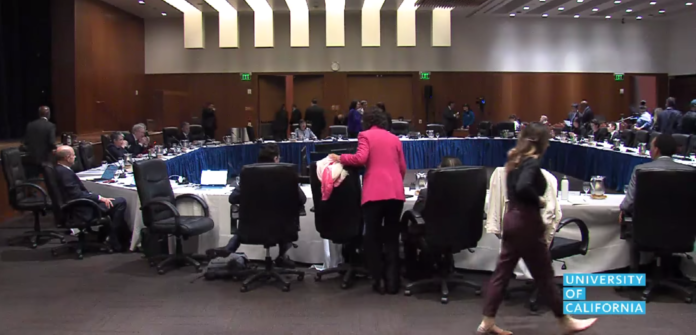Undergraduate nonresident tuition will be raised by $762 for 2019-20 school year
The University of California Board of Regents held meetings at the UCSF campus on from May 14 to 16 to discuss its regular business matters, including a potential affiliation with Dignity Health and tuition increases for nonresident students.
The Regent’s Health Services Committee convened in a closed session for a “Discussion of Legal Considerations for Strategic Affiliation with Faith-Based Health System, UCSF Health, San Francisco Campus” on the third day of meetings. The UC was considering an affiliation with Dignity Health for a little over a year, which had sparked controversy in several communities and generated a petition from the American Civil Liberties Union.
Critics of the potential affiliation believe some of Dignity Health’s policies discriminate against women and LGBTQIA+ individuals. Dignity Health, a Catholic healthcare system, requires its hospitals to uphold specific ethical and religious directives.
However, since the May Regents meeting, UCSF has cancelled the potential affiliation with Dignity Health in what the Los Angeles Times calls “a victory for reproductive rights.”
Over the three days of the Regents meeting, hundreds of individuals stood up and spoke out against the affiliation between UCSF and Dignity Health. Among these included a representative for Dr. Patricia Robertson, a professor at UCSF who specializes in obstetric care.
“I could not, in good conscience, transfer my patients to a Catholic system because of the restrictive care,” Robertson said. “We have built UCSF into an inclusive and compassionate health system with the best medical care in the world — why would we, now, go backward so women and LGBTQ patients are second class citizens?”
Her concerns were echoed by many other speakers, and on May 28, Sam Hawgood, chancellor of UCSF, issued a letter to the public informing them of the halted negotiations.
“We respect and appreciate the diversity of opinions from multiple stakeholders both within UCSF and outside our University, and we have heard you all,” Hawgood said. “Given the concerns, we will not continue to pursue the affiliation as it had been envisioned, which would have created a stronger link between UCSF Health and Dignity Health’s four Bay Area hospitals.”
While the affiliation appears to be halted, the Regents did approve something else: tuition increases.
The recommendation to increase undergraduate Nonresident Supplemental Tuition (NRST) was brought up at a Regents meeting in March, but the Regents tabled it over concerns about the potential impact this increase may have on “financially needy” students.
However, the raise was discussed again on May 16, when the Regents voted 12-6 in favor of increasing NRST by 2.6%, or $762, for the 2019–20 school year. This addition brings the price of tuition for out-of-state students to a grand total of $29,754. This new tuition price was calculated using an expected inflation rate of 3.4% 2019–20.
To settle the initial concerns voiced over how this may impact financially burdened students, the university proposed to allocate 10% of the new revenue to support nonresident and international students in need. New revenue generated from this increase is estimated to be around $28.9 million.
“Setting aside 10% of the new tuition revenue would allow campuses to cover the increased cost for those students, for example, or to assist other needy students for who the increase might pose an obstacle to enrollment at UC,” said UC President Janet Napolitano during discussions.
For Sarah Abdeshahian, this did not seem like an adequate solution. The third-year political science and economics double major from UC Berkeley voiced her concerns during the public comments on May 16.
“The proposal puts us at risk of further eroding two cornerstones of this university — its affordability and its accessibility,” Abdeshahian said. “Students should not have to bear the burden of the UC funding gap. Nonresident students diversify the university community and raising their tuition even more would merely exacerbate their financial struggles.”
Nevertheless, Napolitano defended the board’s choice and explained the necessity that prompted this decision.
“As we all recognize, our needs are great,” Napolitano said. “Without this, we had another $30 million hole and that will have an impact on the educational program we can provide our undergraduate students — be they from California, or be they from out of state.”
Written by: Claire Dodd — campus@theaggie.org









